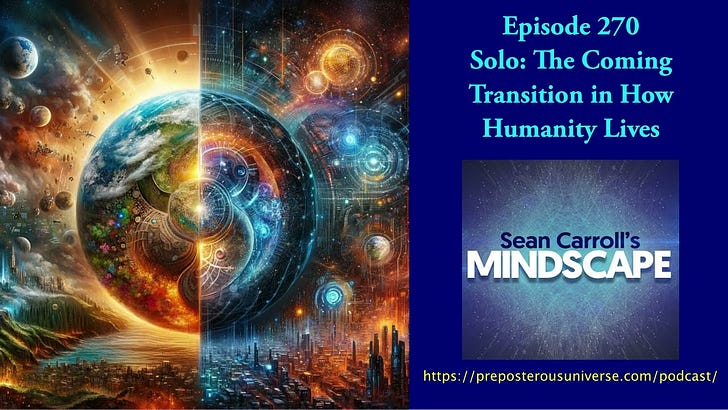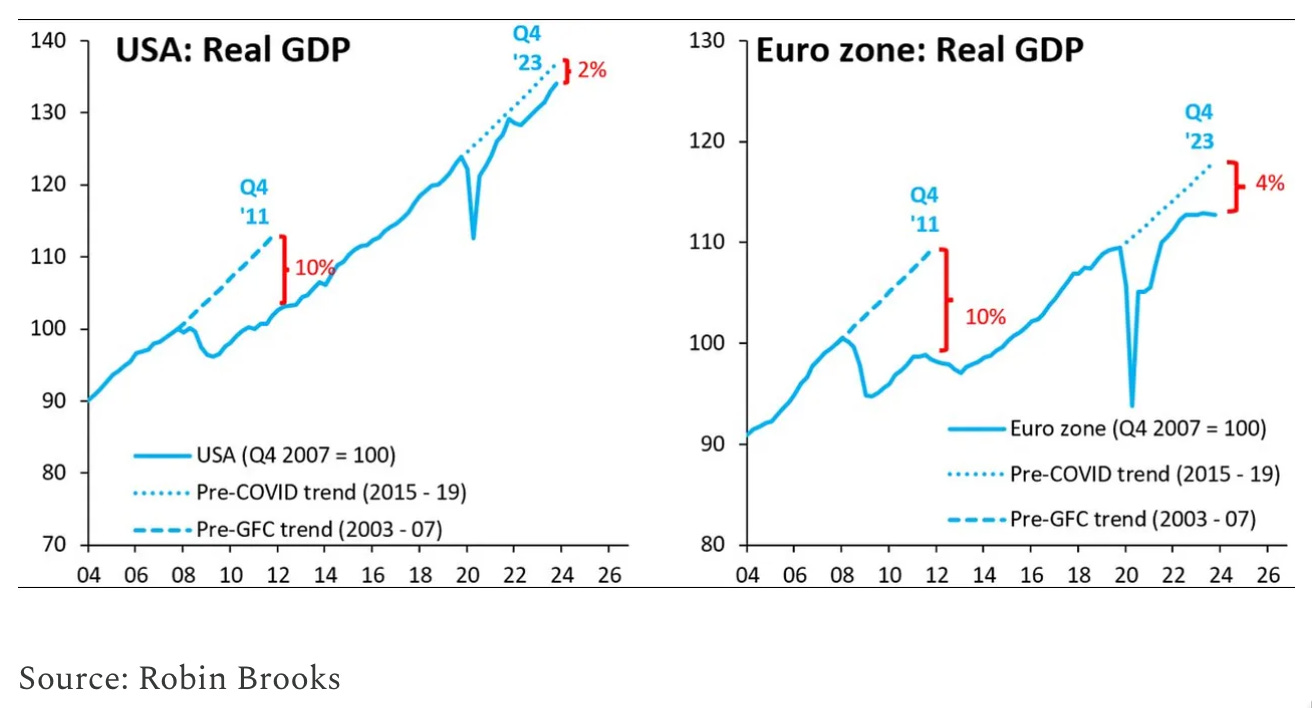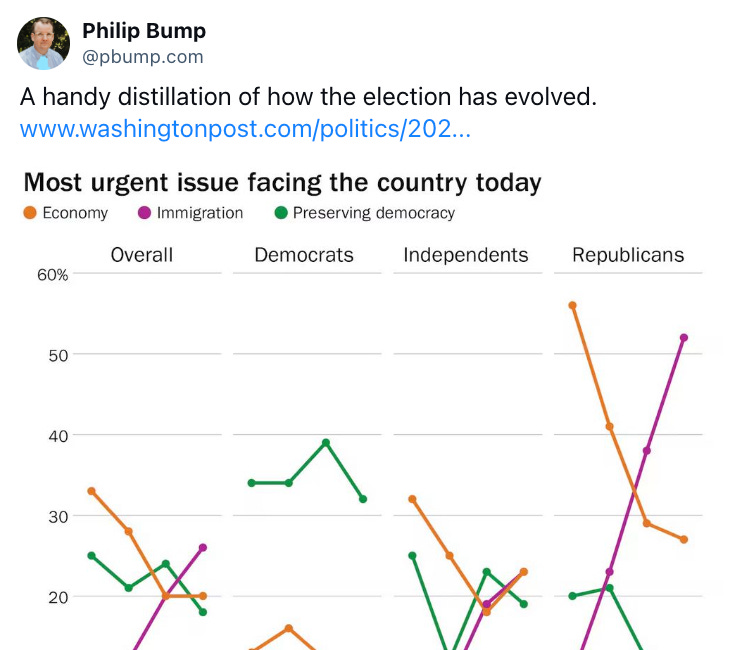BRIEFLY NOTED: For 2024-04-06 Sa
The rising possibility of not a soft landing but rather of no landing; data science & standard liberal arts as the new trivium & quadrivium foundational curriculum; Sean Carroll on the forthcoming...
The rising possibility of not a soft landing but rather of no landing; data science & standard liberal arts as the new trivium & quadrivium foundational curriculum; Sean Carroll on the forthcoming not-really-a-singularity in human society; the US & the Eurozone since 2004; very briefly noted; & BRIEFLY NOTED for 2024-04-02…
SubStack Notes:
Economics: With each month that passes in which what we thought was a substantially restrictive monetary policy fails to send the economy into a recession accompanied by a frantic reversal and easing, the odds of the particular "long boom" scenario increase. This "long boom "scenario is one of a substantial increase in the perceived value of investment driving interest rates markedly higher for a time—at least the medium term. Whether we avoid having it all ending in tears depends on whether we (a) actually get the productivity boosts that investing firms see within their grasp, and (b) successfully rebalance the economy to lower-deficit and lower-consumption shares of output configuration in time:
Tracy Alloway & Joe Weisenthal: Odd Lots Newsletter: It's the Long Boom: ‘This is the macro story of the moment. The Long Boom. The no landing. The economy that keeps chugging along mightily, even in the face of high rates and a presumed rate cutting cycle that keeps getting pushed out further and further into the future…. Greenification… electrification… artificial intelligence and data-center boom… nearshoring…. One of Steve [Eisman]’s main contentions is that companies that used to be cyclical have turned into secular… sustained demand tailwinds for things like cement, or lighting or HVAC equipment… that won’t necessarily fluctuate with this quarter’s GDP or the next one…. That transition from cyclical to secular is broadening out with all the secondary and tertiary companies facilitating this capex boom… <bloomberg.com/news/newsletters/2024-04-…>
Human Capital: What will be the metis of the tekhne of MAMLM? What will be the skill- and experience-sets that allow people to use generative AI and related tools powerfully and effectively in the future? In my view, a good deal of it will be computer science-adjacent. Why? For the same reason that a deep fluency in Old Enochian was essential for a successful demon-summoning wizard. But I think Tim Burke is right that a liberal education—the set of knowledges that orient you to the human world and to how humanity works as an anthology intelligence that the Trivium and the Quadrivium were groping toward a thousand years ago—is still the right way to go:
Tim Burke: ‘I’m reaching for… a future with generative AI where it’s a tool with limited but considerable uses… the enhancement of other intermediaries and tools. The word processor… changed the process of writing in some very notable ways…. We’ve accepted the word processor and embedded the changes in our collective understanding of the work of writing.… If you look at… Midjourney, the people who are consistently getting the most interesting and valuable results… know art history… about visual aesthetics… how generative AI generally works, and… Midjourney as a tool and interface. They also often know where to find digital images and how to process and alter images in other tools…. There are people I see using it who are good at all of those things, and it shows… If we are… training shepherds of AI… that program of study… will… be… effective connection between existing things [we teach]… <timothyburke.substack.com/p/academia-th…>
ONE AUDIO: Sean Carroll Believes Not in the Singularity But Rather in a Likely Imminent Phase Transition in Human Life:
ONE IMAGE: US & Eurozone since 2004:
Very Briefly Noted:
Economics: Kevin Nguyen (2023): The next era of San Francisco commercial real estate will begin in 2024: ‘One of the last major commercial real estate moves of the year in San Francisco was… the 20-story office tower at 33 New Montgomery St. is being listed at $80 million, a 46% haircut from the $146 million it traded hands for in 2014…. An increasing number of those who made investments before the pandemic are now coming out on the losing end…. What’s… likely is that 2024 will represent a turning-of-the-page moment in San Francisco, a real estate reset where past expectations are no longer palatable, and well-positioned players enter the game buying low…. Falling property values have prompted other parties just last week to settle with lenders for a reduced price instead of the costly and time-consuming foreclosure process…. 115 Sansome St., where the Vanbarton Group won a competitive bid on a building it already owned. The owners reportedly closed an all-cash deal for around $35 million, which is less than the $54 million loan it took from Bank of America in 2016, according to public records… <https://sfstandard.com/2023/12/22/downtown-san-francisco-commecial-real-estate-new-era-2024/>
Martin Sandbu: Three economic zombies worth fighting: ‘Bad policy ideas that are surprisingly widely held…. My third bugbear is a particular form of opposition to the minimum wage… [now] 25 years… in the UK, and… [at] the longtime aspiration level of two-thirds of the median wage for workers above 21 years of age…. [It] has not reduced employment. As Gavin Kelly explains in an FT op-ed, “this is what a policy triumph looks like”…. But old habits die hard and there is still an instinct in policy circles, let alone in business circles, to assume that stricter rules for how employers treat their workers are ipso facto a brake on productivity…. [There] cannot be an argument against enforcing the laws already on the books that it would be inconvenient for businesses to have to follow them. Weak enforcement… only serves to undermine law-abiding companies…. Making it harder for businesses to stick to their unproductive habits is a feature, not a bug… <https://www.ft.com/content/8dc64a68-ca1e-4632-9888-9eaf3826ca76>
Matt Levine: A Hedge Fund That’s Also a Newspaper: ‘One way to think of this business model is that Hunterbrook is essentially an activist short-selling hedge fund, like Hindenburg Research: It investigates companies, finds problems, shorts the companies, and then noisily publishes its investigation…. Another way to think of this business model is that it is a salary arbitrage. It is expensive to hire hedge fund analysts to investigate companies all over the world. It is cheaper to hire journalists! You might find more tradable signals with 20 journalists than you can with one hedge-fund analyst…. If you can find out bad news about companies, there are a lot of ways to make money. Selling ads is not one of the better ones!… <https://www.bloomberg.com/opinion/articles/2024-04-02/a-hedge-fund-that-s-also-a-newspaper>
Central Country: Sarah Zheng: China's Vague Hopes for Tech to Reboot Its Economy: ‘I’m just back from Beijing’s annual meeting of the China Communist Party elite…. At the Great Hall of the People last week, members of China’s ruling party gathered to talk about how to boost innovation, particularly in “disruptive and frontier technologies.” That came with a 10% increase in this year’s national budget for science and technology, to $51.6 billion. Now, after Beijing’s bruising crackdown on the internet sector, it seems that President Xi Jinping is looking to other segments of its vast tech industry—like chips and AI—for answers on how to revive growth. But it was difficult to find those answers…. I finally managed to stop a member…y from Guangdong, who said his focus this year was on promoting “new productive forces” through technological innovation. But when asked about how this would help China deal with US curbs on chip and tech imports, he paused before mustering: “I have not thought about this deeply yet.” Then he quickly dashed off…. “New productive forces” may be the catchphrase of the day, but there is only so much that can be said on how those forces will be unleashed on the economy and tech sector… <https://www.bloomberg.com/news/newsletters/2024-03-12/china-economy-seeks-hope-in-tech-investment?cmpid=BBD031224_TECH>
Nouriel Roubini: China Confronts the Middle-Income Trap: ‘The shift back to state capitalism over the last decade is plainly incompatible with President Xi Jinping’s development goals…. When China was smaller and poorer, a sharp increase in its exports was manageable in global markets. But now that it is the world’s second-largest economy, any dumping of its excess capacity will be met by even more draconian tariffs and protectionism targeting Chinese goods…. China therefore needs a new growth model concentrated on domestic services—rather than goods—and private consumption…. It is not clear that Chinese leaders fully appreciate the challenges they face…. After sidelining market-oriented technocrats such as Li [Qiang]… Li Keqiang… Yi Gang… Liu He and Wang Qishan… Xi has created new party committees on economic and financial affairs that supersede government bodies… [and] surrounded himself with advisers like He Lifeng… and Zheng Shanjie… sympathetic to the obsolete dogma of state capitalism. Lofty statements and mantras about reforms and attracting foreign investment mean little. What matters are the actual policies that China pursues over the next year, which will show whether it can circumvent the middle-income trap and return to the path of more robust growth… <https://www.project-syndicate.org/commentary/china-middle-income-trap-more-likely-with-state-capitalism-by-nouriel-roubini-2024-04>
MAMLM: K.C. Raybould: ‘AlphaFold has helpd find new therapeutic psychedelics, drug treatments, and neglected diseases. It is… a great example of augmenting human labor… a solved computational problem… as a basis for further research… get to beneficial results much faster…. AlphaFold is literally making the world better in a way imitative AI simply does not. But imitative AI gets the attention and the research dollars. In part because a significant portion of Silicon Valley leadership hates workers and relishes the idea of an all-computer workforce. but more so because it is one area where, if it could ever be made to work as well as it hype-men claim it does/can, then they cold make massive amounts of money…. If we properly incentivized AI companies through liability and copyright laws and used the power of tax incentives and subsidies to reward people who build AlphaFolds more than those who build Fancy Clippy, we can reap the benefits of AI for all of society, not just those at the top of the Silicon Valley pyramids… <https://kcraybould.substack.com/p/the-ai-good-lost-in-the-hype>
Gerben Wierda: ‘What still isn't clear to most people is that with GenAI: (1) useful memorisation and unacceptable training data leakage are technically the same thing; (2) creativity and 'hallucinations' are technically the same thing. They are the same. We just stick two different labels on them based on if we like/want the result or not… <https://open.substack.com/pub/garymarcus/p/when-will-the-genai-bubble-burst?r=d0v&utm_campaign=comment-list-share-cta&utm_medium=web&comments=true&commentId=52886120>
Public Reason: Noah Smith: : ‘The feeling that the world broke in the early 2010s emerged from a perfect storm. Smartphones and social media arrived just in time for Americans to rage at each other over the country’s increasingly racialized politics and the built-up economic stresses released by the Great Recession. Whether America can put itself back together after that storm, or what that new country will look like, is still an open question. Racial polarization is falling, and there are many signs that Americans are starting to turn away from identitarian conflict. Meanwhile, wages have been steadily growing again, inequality has plateaued, and middle-class wealth has recovered. And there are signs that Americans are starting to turn their backs on the most divisive social media platforms and partisan news outlets… <https://www.noahpinion.blog/p/why-did-the-world-break-in-the-early>
Neofascism: Tim Burke: The News: On Definitions: ‘Some… fastidiously insist that Trumpism is not fascist or not even an “ism”… are… defend[ing] the proposition that whatever is bad about Trump is continuously and undifferentiatedly bad about… the last 50, 75 or one hundred years…. In practice, that feels like saying, “If recent events have spurred you to mobilize, we don’t want you, because you didn’t see it was just as bad before now.” It feels at the least like bad politics, a kind of vanguardist exclusivity. But it also feels wrong…. On the other side… some ostentaciously centrist or center-right thinkers who try to contest the use of “fascism”… are moving to create a possible bridge to that catastrophic future that will be just wide enough for the prescient apologists to stomach moving onto the side of a Trumpist regime…. I don’t care what we call… [it] as long as we call it not only bad but comprehensively worse than bad… not business as usual. Your ass-covering apologetics will not protect you, your dreams of domesticating the monsters are folly. There is not a revolutionary pony hiding in the mountains of shit that are now flowing towards the seats of power… <https://timothyburke.substack.com/p/the-news-on-definitions>
Human Capital: Tim Burke: ‘Here and there Zoom University worked out pretty well for students and faculty. There were small numbers of learners who were well-served by online instruction who don’t flourish face-to-face, and students who had mastered the habit of learning on their own powered through Zoom classes much as they would otherwise. There were pleasures in teaching from one’s own home as well, and new pedagogical tricks to try. So while the live demo showed that a fully online university is not the best for most people, not the right thing most of the time, there are things that are going to stick around that are enhancements of our work, not disruptive or destructive… <https://timothyburke.substack.com/p/academia-the-heroic-prompt-engineers>







I think the choice of the word "hallucinate" to describe an AI system producing nonsense was rather unfortunate. The systems are not hallucinating in the sense that they are misinterpreting memories or sense data. They are working exactly as expected, interpreting the data they are presented and the dataset of tuning parameters they were trained with perfectly correctly. The problem is that the algorithm is solving a problem that has nothing to do with the meanings of the tokens as they would be interpreted by a human being.
Maybe fifty years ago, whenever someone said an organism evolved something, someone would correct them and point out that organisms don't evolve. Populations evolve. No one points this out anymore. If you look at what computers can do, technically, from a computer science point of view, they cannot add numbers, not even simple integers. What a computer does, as an electronic device, is manipulate currents and voltages in a manner such that that manipulation can be interpreted as an addition by a human being. I don't think anyone ever corrected any layman saying computers add numbers, but the idea is the same. Don't confuse what an AI program, especially a statistically based large language model, with reasoning about the real world in all but the most limited sense.
We can get away with saying an organism evolved something or a computer added numbers, but we are still far from being able to comfortably say that an AI program answered a question or figured something out. It may have produced a useful set of tokens, but it may have produced nonsense of varying degrees. We may call that nonsense a hallucination, but that's just convention.
Re: Human Capital
All I can say is that humanities-educated people had better become highly aware of how to deal with polluted information if it is to be useful.. That is not to say the STEM-educated will not be mislead, but at least there are good methods to eliminate the garbage.
Unlike those who hype "big data" and now MAMLM, I do not see real creativity that will create a new era in solving complex issues or generate cutting edge science. I see it reducing the menial gruntwork. Like Star Trek computers, just tell the AI what you want and have it work out how to achieve the goal, execute it, and deliver the results. But asking the right, and interesting, questions will remain a human skill for some time to come. If these AIs cannot effectively curate the good from teh bad to build quality models, then I don't see much future for them, except in area where accuracy is not important.
Gary Marcus on information pollution and LLM training.
https://garymarcus.substack.com/p/information-pollution-reaches-new